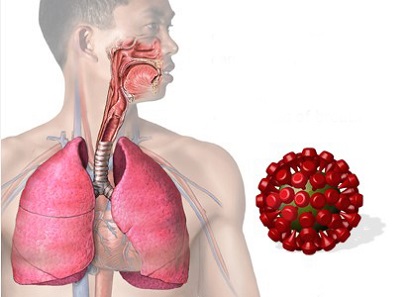Omicron Variants Including JN.1 Show Increased Upper Respiratory Fitness Without Severe Lung Impact
Nikhil Prasad Fact checked by:Thailand Medical News Team Jun 16, 2024 10 months, 1 week, 3 days, 14 hours, 21 minutes ago
COVID-19 News: Recent research has uncovered important findings about the evolution of the Omicron lineage of SARS-CoV-2, the virus responsible for COVID-19. This study covered in this
COVID-19 News report provides a detailed look at how different Omicron variants, including XBB.1.5, XBB.1.16, EG.5.1, and JN.1, have adapted and what that means for the virus’s spread and impact on health.
 Omicron Variants Including JN.1 Show Increased Upper
Omicron Variants Including JN.1 Show Increased Upper
Respiratory Fitness Without Severe Lung Impact
Omicron's Upper Respiratory Advantage
The Omicron variants have shown a significant increase in their ability to replicate in the upper respiratory tract (URT). This means that these variants can reproduce more efficiently in the nose and throat compared to previous strains. Researchers from the U.S. National Institute of Allergy and Infectious Diseases-USA, U.S. National Institutes of Health-USA and University of Amsterdam-The Netherlands conducted experiments on Syrian hamsters and found that these variants replicated well in the URT but caused minimal damage to the lungs. This is a notable difference from earlier variants of SARS-CoV-2, which often led to severe lung infections.
Mild Lung Pathology
One of the major concerns with new variants of COVID-19 is whether they might cause more severe disease. However, the study found that the Omicron variants tested did not lead to significant lung damage in hamsters. Even the JN.1 variant, which had some unique genetic changes, did not replicate well in the lungs or cause severe lung disease. This suggests that while these variants can spread efficiently in the URT, they are less likely to cause serious lung infections.
Hamster Model Insights
The research utilized Syrian hamsters, a common animal model for studying respiratory viruses. The hamsters were inoculated with the different Omicron variants, and their viral loads were measured in both the URT and lower respiratory tract (LRT). All variants showed high levels of replication in the URT, but only minimal replication in the lungs. This aligns with observations in humans, where Omicron infections are often less severe than those caused by earlier variants like Delta.
Impact on Human Cells
To further understand the behavior of these variants, the researchers also studied their impact on human nasal and lung cells. In nasal cells, all Omicron variants replicated rapidly, which correlates with their high transmissibility. In lung cells, however, replication was limited, further supporting the idea that these variants are less likely to cause severe lung disease.
Variants and Transmissibility
Among the Omicron variants, JN.1 showed particularly low levels of virus shedding and failed to transmit between hamsters via direct contact or airborne routes. This suggests that despite its ability to evade immune responses, JN.1 might be less transmissible than other Omicron varian
ts. The other variants, such as XBB.1.5 and EG.5.1, were more successful in transmitting between hamsters, indicating a higher fitness for spread.
Evolution of Omicron Variants
The continuous evolution within the Omicron lineage has led to these variants adapting to replicate more efficiently in the URT while maintaining a lower pathogenic profile in the lungs. This adaptation is likely driven by the need for the virus to spread more easily in a population that has developed immunity to previous strains, either through vaccination or past infections.
Immune Evasion
The study also looked at how well these variants could evade the immune system. It was found that the JN.1 variant had significantly different immune evasion capabilities compared to earlier Omicron variants. This was demonstrated by its reduced replication in the presence of immune responses. The ability of the Omicron variants to evade the immune system while replicating efficiently in the URT suggests that they are well-adapted to the current immune landscape in the human population.
Conclusion
Overall, this research highlights the ongoing adaptation of the Omicron lineage to enhance its fitness in the URT, which facilitates easier transmission among people. The reduced severity of lung disease associated with these variants is a positive finding, indicating that while Omicron variants are highly transmissible, they may not lead to the severe outcomes seen with earlier strains of SARS-CoV-2.
Understanding these evolutionary trends helps in anticipating the future course of the pandemic and preparing appropriate public health responses. The findings underscore the importance of continued surveillance and study of SARS-CoV-2 variants to stay ahead of the virus and mitigate its impact on global health.
The study findings were published on a preprint server and is currently being peer reviewed.
https://www.biorxiv.org/content/10.1101/2024.06.13.598902v1
Thailand
Medical News would like to add that the one of the short-comings of the study is that it did not go further and investigate Omicron’s tropism towards the other organs and tissues in the human host. There is very strong suspicions that the newer SARS-CoV-2 Omicron sub-lineages are moving evolving towards enhanced tropism and infection of the organs and tissues of the CNS, Cardiovascular, Gastrointestinal, Nephrological, Hepatological and Endocrinal systems.
For the latest
COVID-19 News, keep on logging to Thailand Medical News.
Read Also:
https://www.thailandmedical.news/news/jn-1-leading-rise-in-covid-19-in-ireland-with-new-symptoms-of-insomnia-and-anxiety-becoming-prevalent-hinting-at-possible-enhanced-neurotropism
https://www.thailandmedical.news/news/covid-19-news-scientists-unveil-molecular-mechanisms-underlying-sars-cov-2-hepatotropism-and-liver-damage
https://www.thailandmedical.news/news/covid-19-news-study-validates-that-sars-cov-2-exhibits-ocular-tropism-and-is-able-to-cause-vision-issues
